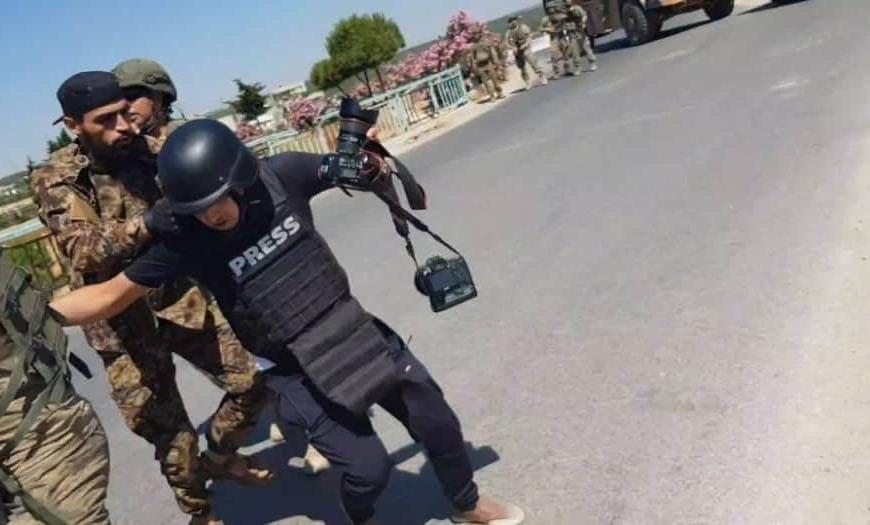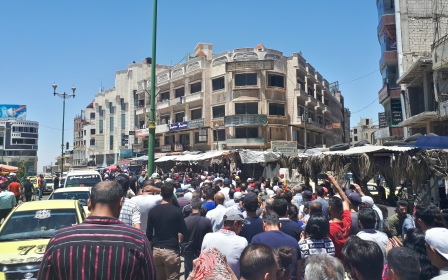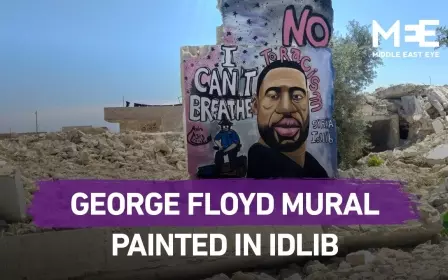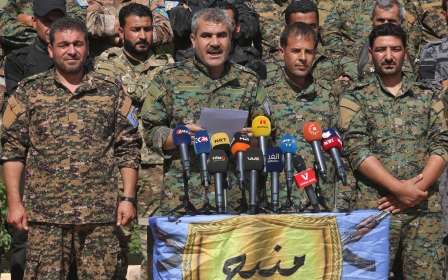Syrian militants attack journalists covering Russian-Turkish patrol

Hay’at Tahrir al-Sham militants attacked a group of journalists covering a joint Turkish-Russian military patrol in northwest Syria’s Idlib province on Wednesday, causing outrage in the rebel-held enclave.
The attack took place near Turkish soldiers supervising the patrol on the M4 highway south of Idlib.
About a dozen journalists were present photographing the Turkish-Russian operation, which began in early March as part of a deal hatched between rebel-backer Ankara and government ally Moscow to de-escalate fighting.
The journalists that were attacked work for both local and international media outlets, and included Ali Hajj Suleiman, a photographer working freelance with Middle East Eye.
Omar Haj Kadour, who works for the French AFP news agency, was among those attacked, and images of him being assaulted were shared widely by activists.
New MEE newsletter: Jerusalem Dispatch
Sign up to get the latest insights and analysis on Israel-Palestine, alongside Turkey Unpacked and other MEE newsletters
'My colleague working with AFP got hit first, and when we tried to remove the people from him, everyone was assaulted'
- Izzeddin Idilbi, Anadolu
“We were doing our work safely, and routinely,” Izzeddin Idilbi, a freelance photographer with the Turkish Anadolu Agency who was also beaten, told MEE.
Syrian journalists have gathered on the M4 regularly to cover the patrols, which are controversial because of the Russian presence.
HTS, its supporters and other Syrians residing in Idlib maintain that Russia, which has swung the Syrian war decisively in President Bashar al-Assad’s favour with its supporting air strikes, should have no presence in the province.
"Every week, we document the crossing of patrols, as a number of women gather to hit Russia's patrols with stones," said Idilbi.
"My colleague working with AFP got hit first, and when we tried to remove the people from him, everyone was assaulted."
According to Idilbi, the assault left some bruised, with one photographer losing a lense.
"We are proud of these women, and it is our duty to convey the popular position on Russian patrols to the whole world," he added.
Russian tensions
Turkish soldiers, police and allied rebels have previously stood guard as the Russian patrols have rolled past. On Wednesday, soldiers attempted to keep protesting women from the Russian military vehicles.
"At first, Turkish army personnel stood as a barrier stopping the women from beating the patrols with stones, but women overcame them," Moaz al-Abbas, another attacked journalist working for the local Baladi News agency, told MEE.
"After the patrols passed, everyone started to leave. One of the members of HTS came and started screaming and saying 'why do you take pictures of the women'," Abbas recalled.
"Things escalated, then other elements from HTS came, and they started beating us. One of the reporters was hugging his camera while he was being beaten, fearing that it would be broken”
According to Idilbi, there were other members of HTS who stood by without reacting.
In a statement, the militant group said it had met with the journalists and apoligised to them. The assault was an individual attack that does not represent the group, HTS said, adding that the matter will be referred to the local judiciary.
Hay’at Tahrir al-Sham is the former Syrian branch of al-Qaeda, and seized control of most of Idlib through violent confrontation with other, more moderate, rebel factions.
Renowned for its hardline rule, HTS has been slammed on social media over the past two days for reportedly defacing a mural of George Floyd, the Black man killed by US police in Minneapolis that has sparked worldwide protests.
Press freedom NGO Reporters Without Borders ranks Syria as 174 of 180 in its list of countries where journalistic work is safest.
Hundreds of media workers have been killed by the Syrian government forces, militant groups and other parties to the conflict since the outbreak of the Syrian revolution in 2011.
Many media workers are afraid to report the risks and attacks they are exposed to for fear of losing their jobs or being subjected to domestic reprisals.
Middle East Eye delivers independent and unrivalled coverage and analysis of the Middle East, North Africa and beyond. To learn more about republishing this content and the associated fees, please fill out this form. More about MEE can be found here.




